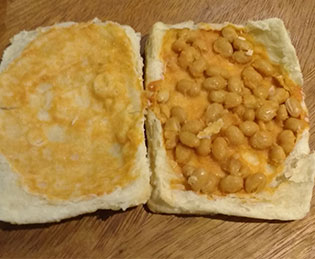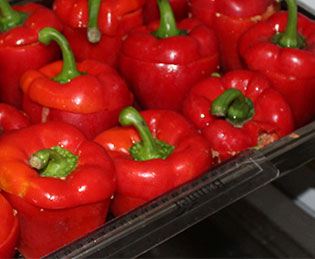Food can impact on a prisoner's behaviour, health and even chance of rehabilitation. Here Helen Sandwell, Project Lead at Food Matters Inside & Out, explains how…
The Food Matters Inside and Out project is run by the charity Food Matters. It aims to change food systems within prisons and, in doing so, enable prisoners to make healthier food choices. The project was piloted at HMP Wandsworth and is currently at HMP High Down.
Various factors need to be in place for an individual to make heathier food choices. Not only do the food choices available to them need to be health-promoting and affordable, but also the person needs to have sufficient knowledge, attitude and intent to eat that food.
For these reasons, Food Matters takes a whole-prison approach to

changing the food system. Project staff work alongside prison catering staff to support them through the change of developing healthier menus which remain within prison budgets. They encourage staff involved with the canteen to provide affordable, healthy choices which have often been requested by prisoners. They also work in partnership with communications staff to put in place appropriate food-related health promotion, using printed literature as well as radio, TV, the Custodial Management System and events such as well-being days.
Participatory healthy eating and cooking workshops form another part of this project. These involve reflective and motivational activities to embed learning – and there are always tasty, healthy snacks to try. From these courses, interested and trustworthy participants are invited for further training to become ‘Food Champion’ peer supporters.
But why direct resources to improving food when funding is so stretched and there are bigger priorities such as mental health and substance misuse to tackle? Does changing the food that offenders choose to eat reduce the rate of reoffending?
A literature search for the effect of food on offending behaviour produces only a handful of studies. This is not surprising since nutrition research is notoriously difficult, as is research within prisons. Nevertheless, two robust randomised, double-blind, placebo-controlled intervention studies (Gesch 2002, Zaalberg 2010) have shown a reduction in the aggressive and rule-breaking behaviour of offenders serving custodial sentences as a result of nutrient supplementation.
What we do know is that a poor-quality diet can, and does, impact on physical health – for example in obesity, type 2 diabetes, heart disease and circulatory problems, some cancers and other non-communicable illnesses. Poor mental health is often associated with these illnesses, as is chronic pain. Mental and physical health are factors known to be linked to reoffending.
Both poor mental health and pain are two reasons that people self-medicate with drugs, which can lead to substance misuse, worsening mental health and a life of crime to support a drug habit.
Emerging nutrition research focusses on whole diet rather than supplements and demonstrates how closely diet and mental health are linked. The SMILES study (Jacka 2017, foodandmoodcentre.com.au) was the first randomised, controlled intervention study to demonstrate that depression can be improved through giving dietary advice which recommends a modified Mediterranean diet. Since depression can also be improved through other lifestyle interventions – physical exercise, improving sleep, reducing nicotine and alcohol as well as drugs – Food Matters sees the role of HMPPS (Her Majesty’s Prison and Probation Service) as key in directing resources to encouraging and enabling diet and other lifestyle behaviour change amongst the prison population.

But it is not just about changing the nutritional quality of food. The Food Matters Inside and Out Project encourages prisons to consider all aspects of the journey that food takes from being prepared to being eaten. Food has immense emotional importance – what it looks like, the smell, temperature, how it is presented, where it is eaten and who with, can all positively or negatively affect one’s emotional state. The scenario of a meal, grown cold from sitting on a broken hotplate, slopped carelessly onto a plate, with a fistful of side veg thrown on top, and then eaten in an overcrowded cell, close to a toilet, is a commonplace one. Her Majesty’s Inspector of Prisons noted (Life in prison: Food, 2016) that such conditions undermine respect for prisoners’ dignity, and concluded about many prison food environments: “This does little to improve what for many prisoners, is a history of an unhealthy lifestyle. It also potentially jeopardises prisoner and staff safety.”
Or as one prisoner put it about getting food right: “Food could bring about world peace.”
More more information on Food Matters, call 01273 431707 or see the website.
Photos: While working with Food Matters, HMP Wandsworth reduced the amount of processed food and introduced more vegetable and fish dishes cooked from scratch. Above: bean pastie dropped from menu, in favour of stuffed peppers which provide three portions of veg.





